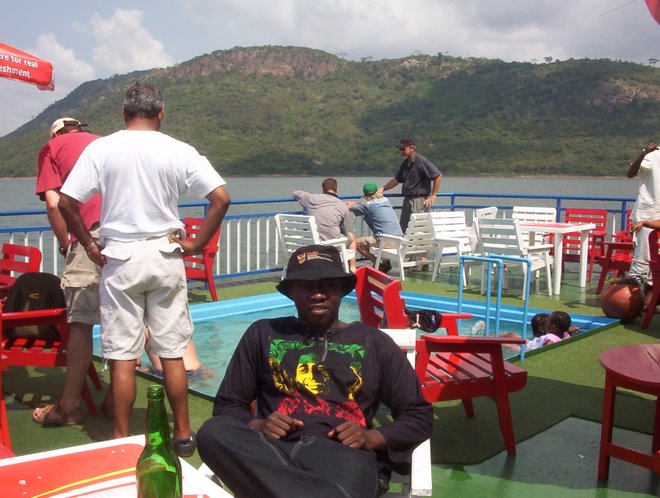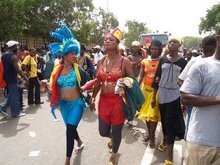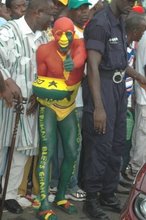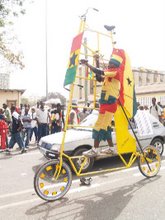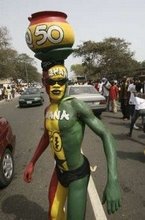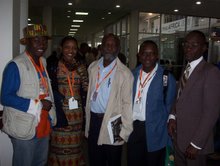The reason why petroleum products such as gas and petrol should not be sold in residential areas, was given expression last Friday evening, when the Engas Filling Station at Asokwa, a suburb of Kumasi suffered a devastating explosion.

LOUD BOOM
A loud boom, which shook several houses, near the gas station and others several metres away in the metropolis, shattered wooden doors, ceilings and glass doors and windows of some of the houses.
It also burnt 20 vehicles, six of which were packed at the gas station including the gas tanker, which was dispensing gas at the time and a tipper truck, which was partially burnt.
Among the hardest hit were houses opposite the gas station and those adjacent to it as well as others several hundred metres away.
Hotel de Texas a few metres away had all of its glass windows and doors completely broken and so was another building directly opposite the gas station, which suffered the same fate.
Another building housing the African Development Bank (ADB) at the Millennium Plaza and a Shell filling station about a hundred or more metres away had most of their glass windows and doors destroyed.
A vehicle repair shop, a restaurant and a chop bar as well as a sawmill sharing walls with the gas station were severely damaged.
Flames which shot up high several feet into the air and was seen as far away as Asafo and surrounding areas also burnt a number of people who were rushed to hospitals across the metropolis.
The force of the blast was so huge that it carried part of the steel cover of the tanker over a hundred metres away into the compound of The New Asafo Junior High School.
CAUSE OF EXPLOSION
According to ASP D.K. Gyabaa Crime Officer of the Asokwa District Police, who briefed this paper on the cause of the accident, around 5.30pm, while a gas tanker was dispensing gas at the station, the nozzle of the tube came off from the tanker, hit the floor and sparked a fire.
Workers immediately started running helter skelter for dear life. Consequently, the fire became uncontrollable and before fire personnel from various parts of the metropolis got to the scene, there was a raging inferno.
This eventually resulted in a number of explosions which caused injuries and destroyed property. According to ASP Gyabaa, about 140 people were injured and they were sent to hospitals across the city. Thankfully there were no deaths.
INJURED PEOPLE
At the Komfo Anokye Teaching Hospital (KATH) that, the hospital received 123 people with various degrees of burns.

According to Dr. Stephen Opuni, Head of the Accident and Emergency Department, 15 of the people had severe burns and are at the Burns Unit.
Ten others were admitted at the Casualty Department while two went on admission at the Intensive Care Unit.
However over 90 people were treated and discharged. About 20 doctors including some who were off duty all came by to assist in treating the injured.
Pharmacists, paramedics, nurses, and management staff of the hospital including Dr. Karikari, Medical Director, Mr Offeh Gyimah, Director of Administration, Director of Pharmacy, Mr Frank Amoh and Director of Nursing services, Mrs Patience Ampomah were all around to help calm the injured.
Dr Opuni praised the National Fire Service and the Police for handling the situation effectively and for sending the injured immediately to the hospital.
Dignitaries
Some dignitaries were also there to visit the injured at the hospital. They included Mr Kan Dapaah, Minister of Defence, DCOP Frank Adu-Poku Ashanti Regional Police Commander and Mr Osei Asibey Antwi, Deputy Ashanti Regional Minister.

In another development, Mr P.K. Manu a political activist who together with others fought against the siting of the gas station at its present location, said even though it was an unfortunate incident, he and all those who fought against the siting of the station there, have been vindicated.
Protests

According to him in 2000, the owner of the land decided to relocate the public toilet, which was on the land to another place and site the gas station there, but he and some others protested because, it was not safe as the location, was a residential area and also had a school nearby.
“I went with a delegation to see the late Osei Kweku who was the Member of Parliament here and he agreed to see the then KMA boss Hon. Maxwell Kofi Jumah.”
“Initially Mr Jumah agreed that the station could not be sited there, but afterwards Mr Jumah, the Assembly member Mr Adjei Darko a.k.a, Action and the late Osei Kweku, came to the site and said where the toilet was sited was not good,” he added.

Mr Manu continued that the same day, the toilet was broken down by a bulldozer on the orders of the ex-mayor and the owner of the place known as Mama Pat, claimed that all the relevant organisations had approved for the gas station to be built.
He also mentioned that with the support of the Buffalo Unit, who came on the scene Mama Pat had the foundation of the place laid.
“I thank God that there are no deaths and hope that this will be a lesson for the future,” He said.
Most people who flocked the site of the incident to witness it were full of praise for the NFS and the police who did well in fighting the fire and protecting property as well as controlling the crowd.





















































